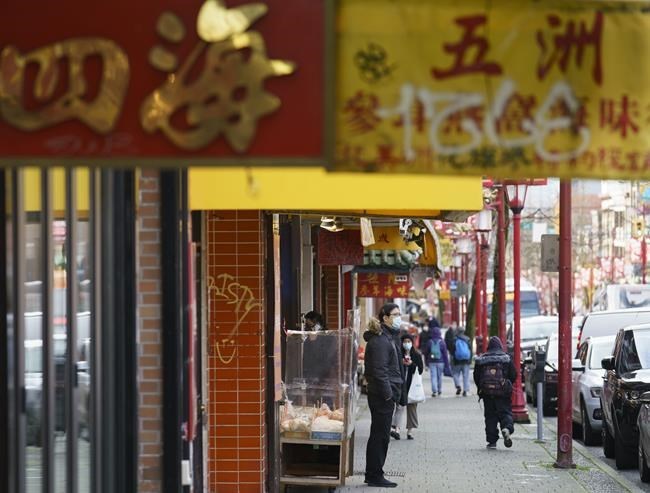OTTAWA — At the outset of the COVID-19 pandemic, Amy Go knew Canada was about to repeat history.
The president of the Chinese Canadian National Council for Social Justice said she braced herself for the targeting of Asian Canadians, as had occurred in the 19th century with the "yellow peril" discourse accusing the population of being dirty and disease-carrying.
"Unfortunately, it has gotten far worse than we had anticipated," said Go.
Go said she and her family have personally experienced racism in Canada, such as being spat on and having an object thrown at them.
She's among the advocates urging white Canadians to become more aware of anti-Asian racism, as two new surveys highlight the heavy toll of the pandemic on race relations in the country.
A recent study led by the University of Victoria, along with a separate new survey by Leger and the Association for Canadian Studies, provide a clearer picture of how discrimination has harmed Chinese Canadians' well-being and sense of belonging.
The University of Victoria study surveyed 874 first and second-generation Chinese Canadians and found that two-thirds had some experience with being treated disrespectfully.
Doris Mah, co-founder of the Stand With Asians Coalition, said it was noteworthy that the proportion of first and second-generation Chinese Canadians who reported disrespectful treatment was about the same.
She said it shows that language proficiency, profession or income level do not necessarily lower the possibility of these experiences occurring.
"You still feel racism," she said.
About one in three respondents said they had been personally threatened or intimidated, and more than one in four said they had been physically attacked.
Nigel Mantou Lou, lead researcher for the study, said hate and racism are like a virus that affects well-being.
"We have these public guidelines and policy to curb the spread of COVID. But we also need strong public policy and guidelines to address the second pandemic, namely racism," he said.
Lou, who is an assistant professor of psychology at the University of Victoria, said the fact that only 10 per cent of respondents had reported these incidents to police or shared it on social media shows that they feel like they don't belong in Canada.
In a separate survey, Leger on behalf of the Association for Canadian Studies polled 1,547 Canadians, of which 1,255 were white and 75 were of Chinese descent.
Almost half of Chinese Canadians polled said relations with white Canadians had worsened during the pandemic, while only about two in five white Canadians said their relationship with Chinese Canadians got worse.
Go said the discrepancy indicates white people's privilege is shielding them from seeing the lived experiences of Asian Canadians and creating a barrier to change.
If the pandemic-era rise in anti-Asian hate and violence has not convinced more white Canadians to think there is an issue with how Asian Canadians are treated, said Go, "then we are in very big trouble."
The online survey took place between Dec. 3 and 5 and cannot be assigned a margin of error because web-based polls are not considered truly random samples.
A Statistics Canada report in 2021 said police-reported hate crimes of all kinds rose "sharply" to 2,669 in 2020 from 1,951 the year prior. In that period, incidents targeting race or ethnicity nearly doubled.
Police-reported hate crimes targeting the east or southeast Asian population totalled 202 incidents, an increase of 301 per cent.
Go's group, in partnership with other advocacy organizations, created a portal where Asian Canadians could report hate crimes. According to live data from Fight COVID Racism, there have been 1,139 reported incidents of anti-Asian hate crimes across the country as of Friday.
In Vancouver, incidents of anti-Asian hate crime rose by 717 per cent in 2020 compared to the year before, according to a report presented to the city's police board in February 2021.
This report by The Canadian Press was first published Jan. 7, 2022.
——
This story was produced with the financial assistance of the Facebook and Canadian Press News Fellowship.
Erika Ibrahim, The Canadian Press




